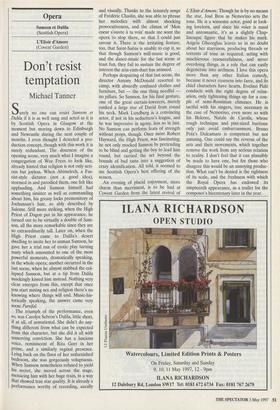O pera Samson et Dalila (Scottish Opera) L'Elisir d'Amore (Covent Garden)
Don't resist temptation
Michael Tanner
Surely no one can resist Samson et Dalila if it is as well sung and acted as it is by Scottish Opera in Glasgow at the moment but moving down to Edinburgh and Newcastle during the next couple of months. I even thought I detected a pro- duction concept, though with this work it is surely redundant. The dourness of the opening scene, very much what I imagine a congregation of Wee Frees to look like, already hinted that religion is not only seri- ous but joyless. When Abimelech, a Fas- cist-style dictator (not a good idea), stormed in and parodied them, one felt like applauding. And Samson himself had something sinister as well as commanding about him, his greasy locks premonitory of Jochanaan's hair, so ably described by Salome. Still more striking, when the High Priest of Dagon put in his appearance, he turned out to be virtually a double of Sam- son, all the more remarkable since they are so extraordinarily tall. Later on, when the High Priest came to Dalila's desert dwelling to incite her to unman Samson, he gave her a trial run of erotic play turning nasty which amounted to one of the most powerful moments, dramatically speaking, in the whole opera; another occurred in the last scene, when he almost stabbed the col- lapsed Samson, but at a tip from Dalila mockingly kissed him instead. Nothing very clear emerges from this, except that once you start mixing sex and religion there's no knowing where things will end. Music-his- torically speaking, the answer came very soon: Parsifal.
The triumph of the performance, even so, was Carolyn Sebron's Dalila, little short, if at all, of sensational. She didn't do any- thing different from what can be expected from this character, but she did it all with unnerving conviction. She has a luscious voice, reminiscent of Rita. Gorr in her prime, and a similarly reginal presence. Lying back on the floor of her unfurnished bedroom, she was gorgeously voluptuous. When Samson nonetheless refused to yield his secret, she moved across the stage, menacing him with her huge train, in a way that showed true star quality. It is already a Performance worthy of recording, aurally and visually. Thanks to the leisurely tempi of Frederic Chaslin, she was able to phrase her melodies with almost shocking provocativeness, and the climax of 'Mon coeur s'ouvre a to voix' made me want the opera to stop there, so that I could just savour it. There is the irritating feature, too, that Saint-Saens is unable to cap it, so that though Samson's mill-music is good, and the dance-music for the last scene at least fun, they fail to sustain the degree of interest the aria-cum-duet has aroused.
Perhaps despairing of that last scene, the director Antony McDonald resorted to camp, with absurdly confused clothes and furniture, but — the one thing needful no pillars. So Samson, for his final gesture, one of the great curtain-lowerers, merely yanked a large star of David from round his neck. Mark Lundberg is a convincing actor, if not in his seductress's league, and he was impressive in agony, less so in lust. No Samson can perform feats of strength without props, though. Once more Robert Hayward, the High Priest, was fascinating; he not only mocked Samson by pretending to be blind and getting the boy to lead him round, but carried the act beyond the bounds of bad taste into a suggestion of crazy identification. All told, it seemed to me Scottish Opera's best offering of the season.
An evening of placid enjoyment, more charm than merriment, is to be had at Covent Garden from the latest revival of L'Elisir d'Amore. Though he is by no means the star, Jose Bros as Nemorino sets the tone. He is a winsome actor, good at look- ing lovelorn, and since his voice is nasal and unromantic, it's as a slightly Chap- linesque figure that he makes his mark. Angela Gheorghiu leaves us in no doubt about her starriness, producing threads or torrents of tone as required, acting with mischievous resourcefulness, and never overdoing things, in a role that can easily degenerate into archness. I love this opera more than any other Italian comedy, because it never coarsens into farce, and its chief characters have hearts. Evelino Pid6 conducts with the right degree of relax- ation, only tightening things up for a cou- ple of semi-Rossinian climaxes. He is tactful with his singers, too; necessary in the case of Nemorino, even more so with his Belcore, Natale de Carolis, whose rough technique and pint-sized baritone only just avoid embarrassment. Bruno Pola's Dulcamara is competent but not amusing. One could say the reverse of the sets and their movements, which together remove the work from any serious relation to reality. I don't feel that it can plausibly be made to have one, but for those who disagree this would be an annoying produc- tion. What can't be denied is the rightness of its scale, and the freshness with which the Royal Opera has endowed its umpteenth appearance, as a trailer for the composer's bicentenary later in the year.


































































 Previous page
Previous page